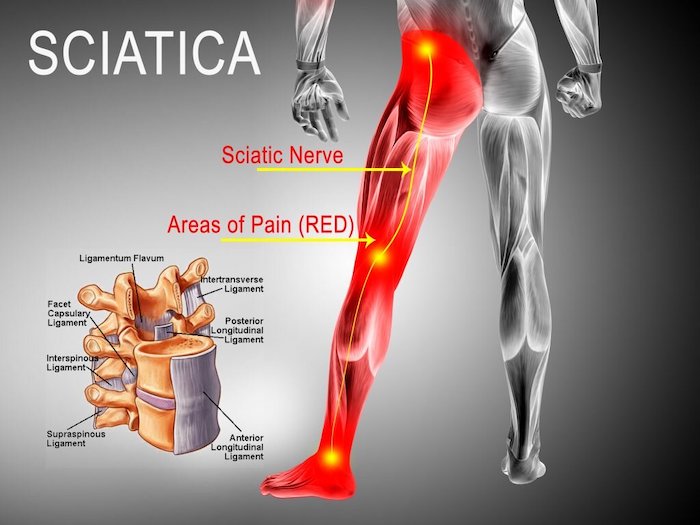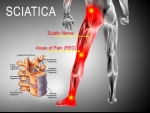
Knee pain that cannot be traced back to a physical injury may be caused by a problem in your lower back. The muscles around your knees are powered by nerves that originate in your lower spine. Irritation or compression of these nerves at their spinal origin causes symptoms, commonly known as sciatica, which may include knee pain and/or weakness.
Read on to learn about how knee pain may feel in the sciatica as well as common examples of lower back and other conditions that mimic sciatica pain in the knee.
Knee Pain May Be a Symptom of Sciatica
Common knee symptoms that you may experience when you have sciatica include:
- A warm sensation, sharp pain, or dull ache in the front, side, and/or back of the knee
- Inability to bear weight on the knee
- Buckling/giving out of the knee
- Weakness while extending the knee (attempting to straighten your leg)
When knee pain is a part of your sciatica symptoms, you may also experience pain in your buttock, thigh, calf, and/or foot. The pain will almost always affect one leg at a time, so knee pain in the sciatica typically does not affect both knees together.
Sciatica is commonly caused by a medical condition that affects your lower back. These underlying conditions may affect your spinal discs, nerve roots, joints, or soft tissues, such as muscles.
L4 Radiculopathy
If you have sciatica, a likely cause of your knee symptoms may be compression of the L4 spinal nerve root (L4 radiculopathy). Common causes for the compression of this nerve root are a herniated disc or spinal stenosis in your lower back.
When the L4 nerve root is affected, you may also experience pain in your thigh and calf.
Tight Hamstrings
Another possible cause for knee pain due to sciatica is tightness in your hamstrings, the group of muscles located at the back of your thigh. When your hamstrings are tight, the stability in your lower back is decreased, the normal curvature of your lower spine is altered, and stresses build up within your spinal joints.
These changes may cause lower back pain and stiffness, with radiating pain from your lower back into your knee and leg.
If your knee pain is caused due to sciatica, your doctor will typically focus on treating the underlying cause. Sciatica symptoms are commonly treated with self-care and medical management. Medical treatments commonly include pain-relieving medications, guided physical therapy, and exercise programs, and/or epidural steroid injections.
Knee Pain That May Mimic Sciatica
It is possible that your knee pain may originate due to a nerve or joint injury other than the typical causes of sciatica, but may feel like sciatic nerve pain. Two common examples are discussed below.
L3 Radiculopathy
A lumbar herniated disc or lumbar spinal stenosis that causes compression of the L3 nerve root in your mid-back region may cause knee pain and weakness. You may also experience pain in the front of your thigh, side of your hip, and the groin region.
Patellofemoral Stress Syndrome
A sharp, burning sensation around the edges of your kneecap may be due to patellofemoral stress syndrome (runner’s knee), a condition where the kneecap (patella) abnormally rubs on the end of the thigh bone (femur).
While this condition typically does not cause pain in other regions, such as the thigh or calf, the hot, burning sensation in the knee along with the resulting weakness may be mistaken for sciatica.
If your knee pain does not subside with self-care, affects your activities of daily living, or worsens over time, consult a doctor for a diagnostic workup. Several back problems that cause sciatica may also result in knee pain, so be sure to mention all your symptoms to your doctor, which will help pinpoint the origin of the underlying cause.
Precision Pain Care and Rehabilitation has two convenient locations in Richmond Hill – Queens and New Hyde Park – Long Island. Call the Richmond Hill office at (718) 215-1888, or (516) 419-4480 for the Long Island office, to arrange an appointment with our Interventional Pain Management Specialist, Dr. Jeffrey Chacko.













